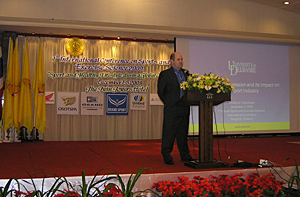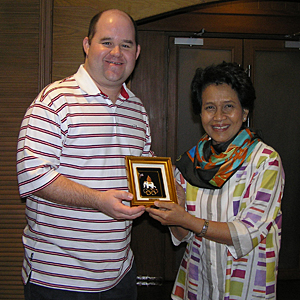

ADVERTISEMENT
- Rozovsky wins prestigious NSF Early Career Award
- UD students meet alumni, experience 'closing bell' at NYSE
- Newark Police seek assistance in identifying suspects in robbery
- Rivlin says bipartisan budget action, stronger budget rules key to reversing debt
- Stink bugs shouldn't pose problem until late summer
- Gao to honor Placido Domingo in Washington performance
- Adopt-A-Highway project keeps Lewes road clean
- WVUD's Radiothon fundraiser runs April 1-10
- W.D. Snodgrass Symposium to honor Pulitzer winner
- New guide helps cancer patients manage symptoms
- UD in the News, March 25, 2011
- For the Record, March 25, 2011
- Public opinion expert discusses world views of U.S. in Global Agenda series
- Congressional delegation, dean laud Center for Community Research and Service program
- Center for Political Communication sets symposium on politics, entertainment
- Students work to raise funds, awareness of domestic violence
- Equestrian team wins regional championship in Western riding
- Markell, Harker stress importance of agriculture to Delaware's economy
- Carol A. Ammon MBA Case Competition winners announced
- Prof presents blood-clotting studies at Gordon Research Conference
- Sexual Assault Awareness Month events, programs announced
- Stay connected with Sea Grant, CEOE e-newsletter
- A message to UD regarding the tragedy in Japan
- More News >>
- March 31-May 14: REP stages Neil Simon's 'The Good Doctor'
- April 2: Newark plans annual 'wine and dine'
- April 5: Expert perspective on U.S. health care
- April 5: Comedian Ace Guillen to visit Scrounge
- April 6, May 4: School of Nursing sponsors research lecture series
- April 6-May 4: Confucius Institute presents Chinese Film Series on Wednesdays
- April 6: IPCC's Pachauri to discuss sustainable development in DENIN Dialogue Series
- April 7: 'WVUDstock' radiothon concert announced
- April 8: English Language Institute presents 'Arts in Translation'
- April 9: Green and Healthy Living Expo planned at The Bob
- April 9: Center for Political Communication to host Onion editor
- April 10: Alumni Easter Egg-stravaganza planned
- April 11: CDS session to focus on visual assistive technologies
- April 12: T.J. Stiles to speak at UDLA annual dinner
- April 15, 16: Annual UD push lawnmower tune-up scheduled
- April 15, 16: Master Players series presents iMusic 4, China Magpie
- April 15, 16: Delaware Symphony, UD chorus to perform Mahler work
- April 18: Former NFL Coach Bill Cowher featured in UD Speaks
- April 21-24: Sesame Street Live brings Elmo and friends to The Bob
- April 30: Save the date for Ag Day 2011 at UD
- April 30: Symposium to consider 'Frontiers at the Chemistry-Biology Interface'
- April 30-May 1: Relay for Life set at Delaware Field House
- May 4: Delaware Membrane Protein Symposium announced
- May 5: Northwestern University's Leon Keer to deliver Kerr lecture
- May 7: Women's volleyball team to host second annual Spring Fling
- Through May 3: SPPA announces speakers for 10th annual lecture series
- Through May 4: Global Agenda sees U.S. through others' eyes; World Bank president to speak
- Through May 4: 'Research on Race, Ethnicity, Culture' topic of series
- Through May 9: Black American Studies announces lecture series
- Through May 11: 'Challenges in Jewish Culture' lecture series announced
- Through May 11: Area Studies research featured in speaker series
- Through June 5: 'Andy Warhol: Behind the Camera' on view in Old College Gallery
- Through July 15: 'Bodyscapes' on view at Mechanical Hall Gallery
- More What's Happening >>
- UD calendar >>
- Middle States evaluation team on campus April 5
- Phipps named HR Liaison of the Quarter
- Senior wins iPad for participating in assessment study
- April 19: Procurement Services schedules information sessions
- UD Bookstore announces spring break hours
- HealthyU Wellness Program encourages employees to 'Step into Spring'
- April 8-29: Faculty roundtable series considers student engagement
- GRE is changing; learn more at April 15 info session
- April 30: UD Evening with Blue Rocks set for employees
- Morris Library to be open 24/7 during final exams
- More Campus FYI >>
1:24 p.m., Dec. 9, 2009----Tim DeSchriver, associate professor in the University of Delaware's Department of Health, Nutrition and Exercise Sciences, delivered a keynote lecture at the first International Conference on Sports and Exercise Science, held in Bangkok, Thailand, Dec. 1-3. The conference focused on sport and healthy lifestyles during the global economic crisis.
DeSchriver's talk addressed the effects of the global recession on the sport industry. With its origins in the housing market and the financial industry, the global recession has spread to include the automobile, airline, restaurant/hotel, and sport industries.
Ticket sales, the largest source of revenue for many sports teams, have dropped, prompting the industry to discount ticket prices, offer special promotions and deferred payment plans, and place renewed emphasis on relationship marketing.
The impact of reduced ticket sales is exacerbated by decreased corporate marketing budgets. Examples of troubled partnerships include the Detroit Tigers and the automotive industry, PGA of America and the Royal Bank of Scotland, and Manchester United and AIG.
To reduce employment costs, many major sport businesses have implemented layoffs, while player salaries have been largely unaffected. In addition, debt, which is necessary to acquire franchises and to construct and renovate sports arenas and stadiums, is now more costly and difficult to negotiate.
And, at the grassroots level, smaller events, teams, and leagues -- for example, participant-oriented running and cycling races, local charity sporting events, and youth sports leagues -- have been cancelled or downsized due to the economy.
According to DeSchriver, the financial future of the sport industry will depend on greater marketing creativity, less reliance on debt, and new relationships between sports and the media.
“Sport management has quickly developed into a global academic field,” he says. “This conference was a great opportunity to discuss the field with sport managers from countries throughout Southeast Asia.”
DeSchriver's research interests are in the fields of sport finance, economics and marketing, specifically in the areas of professional sport and collegiate athletics. He teaches undergraduate and graduate courses in sport management at UD and is a member of the North American Society for Sport Management and the Sport Marketing Association.
Hosted by faculty of the Sports Sciences program at Kasetsart University in Bangkok, the conference attracted some 350 participants from 16 countries.
“The warmth and hospitality displayed by the faculty, staff and students from Kasetsart University was impressive,” says DeSchriver. “They made the trip very enjoyable and they provided me with a great opportunity to experience the culture, food, and sites of their fascinating country.”
Topics addressed at the conference included sports physiology, nutrition in sports, sports medicine, sport and exercise psychology, biomechanics in sports, sport management and tourism, leisure studies, and health and well being.
Article by Diane Kukich


